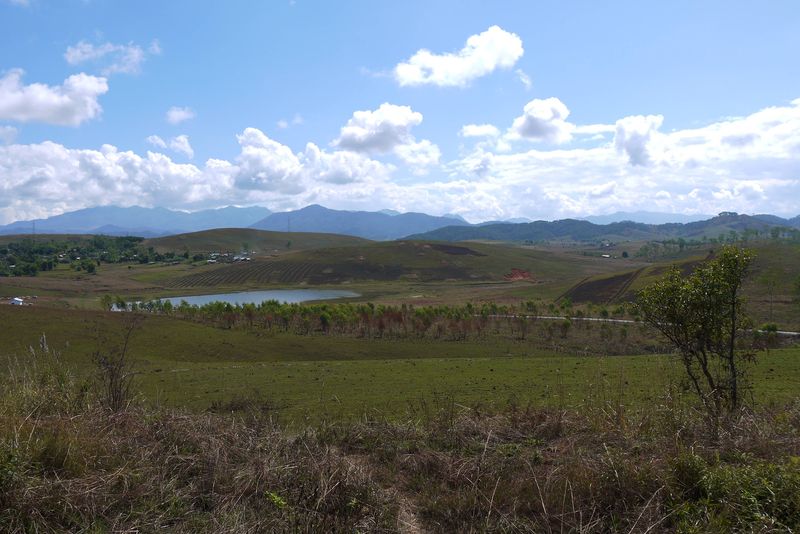
05 Feb The Secret War in Laos
While travelling in Laos we learned the sickening truth about the secret and illegal war the American Government waged on this small, impoverished country. We saw the scars left by a merciless nine-year bombing campaign and met people who, despite having suffered so greatly, still welcomed us into their country with smiles.
As we travel through South-East Asia I am learning more about the tragic history of the region. From colonisation to communism and imperialism, many of the countries we’ve visited have suffered decades of war and devastation, often at the hands of western forces. The secret war in Laos is one of the most disturbing episodes of this bloody history that we’ve learned about so far.
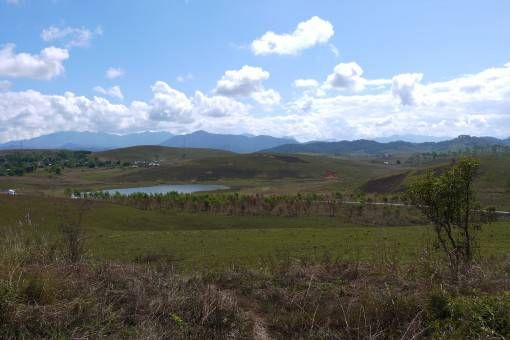
Xieng Kuang: one of the most bombed provinces in Laos
The Secret War in Laos
Despite the fact that Laos was designated a neutral country by the 1961 Geneva Accord, the US military unjustly and illegally bombed the country for nine years during their war with Vietnam. Bombs were dropped on the north of the country to attack the Pathet Laos, a communist faction which migrated into caves to avoid the bombings. The US also bombed Southern Laos in an attempt to disrupt the Ho Chi Minh Trail which ran along the border and was used to transport Vietnamese troops and supplies from North Vietnam to the South. This bombing campaign was kept secret from the American public and even Congress.
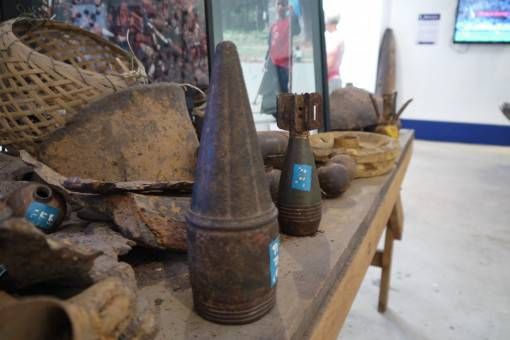
Bomb shells at the COPE Centre
Between 1964 and 1973 over two million tonnes of ordnance was dropped over one third of Laos, making it the most bombed country per capita in the world. Bombings occurred every eight minutes, 24 hours a day for nine solid years, decimating the countryside and killing and displacing thousands of people. Even after the attacks came to an end the devastation continued; around 30 percent of the bombs failed to explode on impact meaning an estimated 80 million of them still litter the country.
War Scars in Laos
At least one person is still killed or injured every day by unexploded ordnance (UXO) in Laos. Sometimes a child out playing will spot a bright yellow ball and mistaking it for fruit or a toy, they’ll play with it until it explodes in their hands. Farmers working their land might strike an old bomb hidden beneath the earth, or a villager may unwittingly light a fire above some UXO, with deadly consequences.
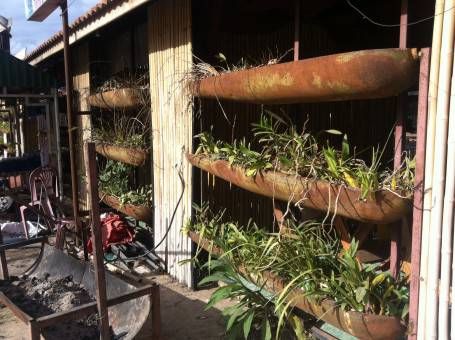
Bomb casings used to grow plants in
The amount of UXO in Laos means that people live with the constant threat of being blown up. Parents fear for their children’s safety when they go out to play, farmers cannot harvest enough land to feed the population and road networks and towns cannot be built or improved because the earth is so contaminated with bombs. All of this means that Laos simply cannot develop economically and people are trapped in poverty – until all the bombs are cleared, Laos cannot heal its war wounds.
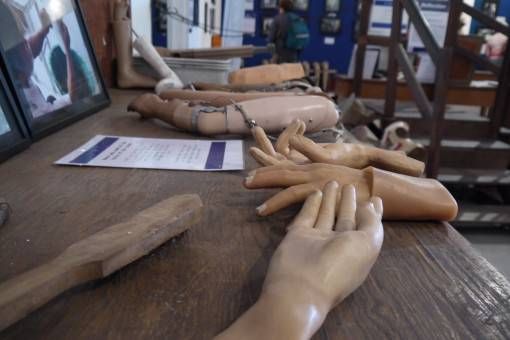
Prosthetic hands at the COPE centre
Crushing poverty levels and the constant threat of being blown up leads to some staggering side-effects. Although it’s illegal, there is a thriving scrap metal trade in Laos, which sees local people, including many children, risking their lives to scour the countryside for UXO to sell. In Russian-Roulette style, others try to dismantle bombs to collect the gunpowder within. These risky endeavours are responsible for around half of the deaths and injuries which occur and are fuelled by desensitisation as well as poverty – bombs are a part of life in Laos, so commonplace that their danger is diminished and their discarded shells are used to prop up houses or plant vegetables in.
Clearing and Banning Cluster Bombs
Efforts are being made to rid Laos – and the rest of the world – of cluster bombs. The Convention on Cluster Munitions was drawn up in 2008 in an attempt to ban these destructive and inhumane weapons. The treaty bans the use and production of cluster bombs as well as the transfer and stockpiling of them; countries that sign the treaty must also provide medical, economic and psychological help to those affected by bombs. So far 113 countries have signed the convention, including the United Kingdom, while only 84 of those have ratified their agreement.
The United States Government has refused to sign the treaty.
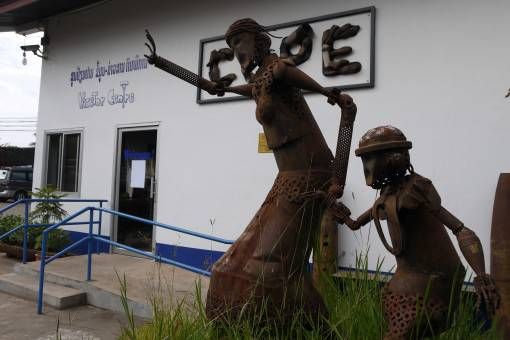
The COPE Centre in Vientiane
Meanwhile, organisations such as the UK-based Mines Advisory Group (MAG) work tirelessly to clear all the UXO in Laos. While in Phonsavanh, a town located in one of the most bombed provinces in Laos, we visited the MAG centre and learned about the work they do training local people to locate and safely remove bombs in Laos and around 40 other countries affected by bombs. This is a dangerous and painstaking process which proceeds slowly; while around 87,000km2 of land in Laos is infected with bombs, just 40km2 is cleared each year.
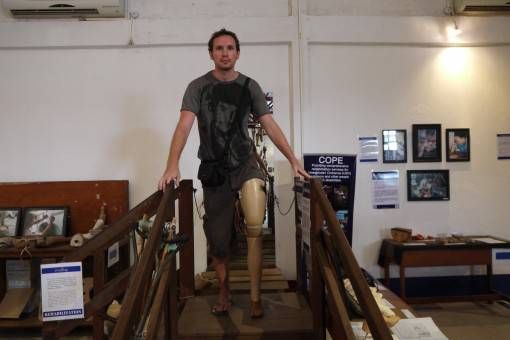
Andrew trying on a prosthetic leg at the COPE Centre
We also visited the COPE Centre in Vientiane and the UXO Survival Centre in Phonsavanh which highlight the work done to help people injured by bombs. We heard plenty of heart-breaking but heartening stories at these centres of bomb survivors who are managing to rebuild their lives with support from these organisations despite debilitating injuries. At the COPE centre we were able to see and even try on prosthetic limbs and watch some amazing documentaries about UXO.
Yes, it will be a long time yet before Laos finally emerges from the shadow of war – but it will.
Sources: The COPE Centre, MAG, the UXO Survival Centre in Phonsovan, the Cluster Munitions Coalition, Vietnam A War Lost and Won (Nigel Cawthorne: 2011: Arcturus Publishing Ltd), Bombies (Jack Silberman: 2002: USA)





Heidi Wagoner
Posted at 08:45h, 05 FebruaryOh this really tugs at my heart. One of my family members wears a prosthetic leg and arm, so I understand how it can impact a life. The routine of putting them on and taking them off and the impact on ones life. I wish the bombs could all just be found and removed. I can’t imagine having a child innocently play outside and then a bomb goes off. This is when it is embarrassing to be from the US. I also felt that way 20+ years ago when backpacking through Guatemala and seeing the harm the US had caused there.
Amy
Posted at 12:54h, 05 FebruaryI wish the bombs could all be removed too Heidi, it’s a problem that once fixed will really allow the country to heal and develop. I know what you mean about feeling embarrassed; Britain and Europe have done a whole lot of colonising over here too and it really shames me.
Jamie Newman
Posted at 15:08h, 05 FebruaryI am just shocked that it has been so long, yet it has taken actually traveling here for my eyes to be open to it. For the vast majoritymajority it’s in the past, yet here it’s every day. It’s sad when farming their own land is such a hazard.
Amy
Posted at 07:36h, 06 FebruarySo true Jamie, our eyes have been opened to so many issues we knew nothing about when we were back in the UK. I wish more money and resources could be put into solving this problem.
Val-This Way To Paradise
Posted at 17:46h, 05 FebruaryWow, this is so sad…this is one of those times when I’m ashamed to be an American…
Amy
Posted at 07:20h, 06 FebruaryIt is shocking. I can’t believe the bombing was kept secret from the public for so long either – the military obviously knew people wouldn’t stand for it.
Rob
Posted at 23:52h, 05 FebruaryWow, that is truly shocking. I had no idea. It’s crazy to think of all the needless brutality, both past and present. Must have been a sobering experience, but it’s good to hear there are organisations helping out.
Amy
Posted at 07:17h, 06 FebruaryHi Rob, yes it was pretty sobering and we learned a lot about UXO. It was heartening to see the work being done to help bomb survivors and clear the ordnance though.
Mat Mat
Posted at 09:55h, 10 FebruaryI like reading your personal experiences. Please write more about what you are doing and what you think you are doing. I can get the rest from any old holiday brochure/blogger typing it in from their Lonely Planets guide.
Amy
Posted at 10:10h, 10 FebruaryHi Mat, I try to write about our personal travel experiences and thoughts as much as possible, I hope that comes across even in more informative posts like this one.